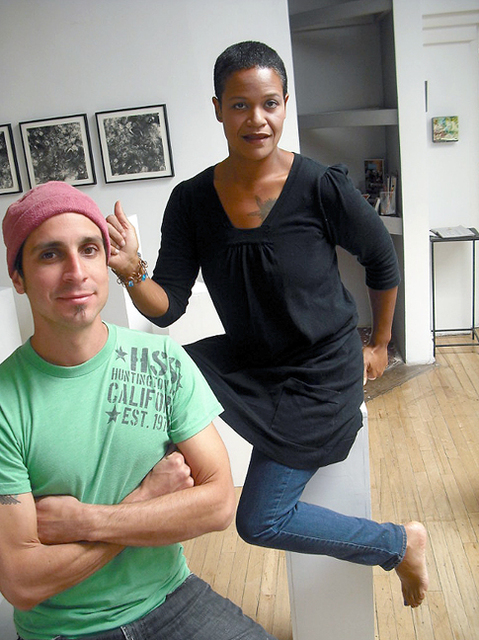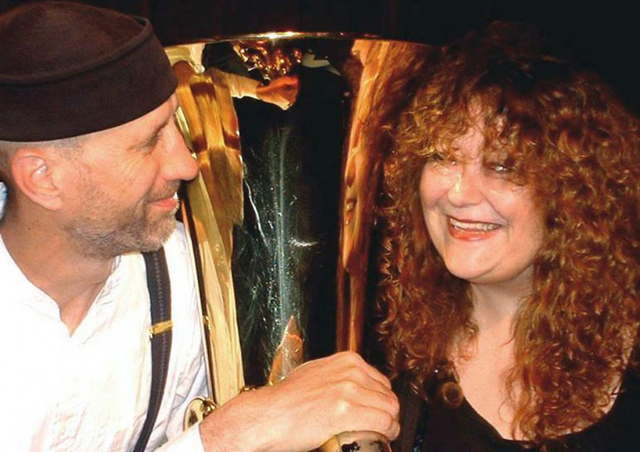Jazz, Deconstructed, a new four-concert series, features local artists with visionary projects that stretch from New Orleans’ Congo Square to an electrocoustic jazz/hip-hop detente.“We really wanted to provide more performing opportunities for local people,” says Maud Beenhouwer, executive director of the New Mexico Jazz Workshop, which is presenting the series. She notes that the more experimental the music, the fewer the opportunities.So every Wednesday in April, the series will present a new project at The Kosmos featuring some of New Mexico’s most popular and adventurous musicians. Evolutionary Sounds (April 7) “It was love at first sound,” says vocalist/poet Amani Malaika, describing her introductory meeting with bassist and producer Luís Guerra.“We’ve been working on projects ever since,” says Guerra. This project features Guerra on bass and electronics, with Malaika on voice and samplers. They’ll be joined by pianist Chris Ishee and visual artist Marya Errin Jones.“We’ll be taking the idiom of jazz and remixing it on the fly,” Guerra says. “We’re going to treat this evening as DJ producers, and we’re going to do that through the history of jazz a little bit.”An intriguing preview track had a mesmerizing dance party feel in among the jazz. For Malaika, that reflects the evolutionary similarities that she sees between jazz and hip-hop and that she and Guerra will be exploring. Resonance (April 14) In a lighthearted moment, vocalist Patti Littlefield describes the music she and low-frequency maestro Mark Weaver (tuba, didgeridoo) make together as “wackadoodle.” Translation: challenging, fun, theatrical, moving and often breathtaking. The duo had planned to do an all-Kurt Weill program. But removed from its dramatic context, much of that material is “pretty pedestrian,” says Littlefield, who brings a background in theater, jazz, blues, pop and R&B to the mix.“We’ve got some new things that we’re working out,” says Weaver, who adds that the program will include originals, completely reimagined standards (“not your usual stuff,” says Littlefield) and some Weill (including a radical revisioning of “September Song”).“We’re tiptoeing further out on the limb,” says Littlefield.“We’re getting used to being out here,” Weaver adds, and they may tempt a guest artist to join them there for the concert. Joy Harjo (April 21) When reached on the phone in early March, poet/singer/songwriter/saxophonist Joy Harjo, a member of the Mvskoke Creek nation, envisioned presenting a narrated show that explores the Native American contributions to jazz, including one important element that “is in our ceremonial dances”: swing.“Most people don’t know that Congo Square, which is kind of considered holy ground or the birthplace of jazz, was the site of Mvskokean tribal ceremonial grounds,” says Harjo. “We’re always left out of the equation … as one of the influences that created jazz and American music. … We’ve been disappeared.”Harjo’s show will include guitarist Larry Mitchell and vocalist Cathryn McGill, who also share Mvskoke Creek heritage, bassist Howard Cloud, and drummer Julian MacDonough. She’s also planning to dance with stomp dancers she’s invited from Oklahoma: Gary Whitedeer, Valerie Harjo and Willie George. Christian Pincock (April 28) Christian Pincock plays it all—antique trad jazz with Route 66 Revelers, the written/improvised hybrid compositions of Mark Weaver’s avant-garde brass group UFO Ensemble and abstract computer-driven improvised music with The Transducers. He’ll be bringing both his valve trombone and computer to the concert to explore what happens when you deconstruct jazz. Joining him will be guitarist Sean Buckley, bassist Luís Guerra and drummer Julian MacDonough.“The idea of deconstruction—I think we’re going to do it compositionally … deconstructing the tune itself,” says Pincock.“It’s kind of progressive jazz,” he adds. “It’s not really avant-garde. I didn’t want it to be a freakout. It’s all original compositions with some adventurous harmonies, and I want it to sound beautiful—even if it gets out, I want it to sound beautiful.”
Jazz, Deconstructed Wednesdays in April, 7 p.m. The Kosmos 1715 Fifth Street NWTickets: $10 or $8 students, NMJW members and seniors at the door or brownpapertickets.comFor more information, call 505-255-9798.












